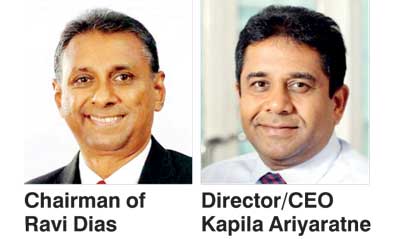Wednesday Feb 25, 2026
Wednesday Feb 25, 2026
Thursday, 23 February 2017 00:43 - - {{hitsCtrl.values.hits}}
In the backdrop of challenging external environment, Seylan Bank yesterday reported a resilient performance.
The bank recorded a profit after tax of Rs. 4,010 million for the year ended that on 31 December 2016, which is the highest profit reported since its inception. In comparison to 2015, after tax profit grew by 4.7%.
Net interest income recorded a moderate growth of 12.03% as a result of the strong balance sheet growth.
The net interest margin contracted from 4.42% in 2015 to 4.19% in 2016 due to cost of deposits increased at a faster rate.
Net fee and commission income witnessed a 15.04% growth from Rs. 2,697 million to Rs. 3,103 million in 2016, mainly attributed to core banking related business.
Other operating income comprising of net gains from trading, gains on financial instruments, gains on foreign exchange and other income decreased by 13.05% from Rs. 1,624 million reported in 2015 to Rs.1,412 million during 2016 mainly as a result of mark- to-market losses on government securities, due to the upward movement in interest rates.
Total expenses recorded an increase of 12.76% from Rs. 8,625 million to Rs. 9,725 million. Expense growth was witnessed by a higher proportion of investments being made towards branch upgrading and refurbishments, continuous development in human resources and technology, which resulted in the underlying expenses increasing rapidly over the previous period. Seylan Bank continues to focus on cost management through strategic cost management initiatives and through the implementation of lean concepts.
The bank reported a significant net credit growth of 22.22%, with net advances growing from Rs. 193,104 million to Rs. 236,020 million during 2016. The Gross NPA ratio has also improved to 4.47% in 2016 compared to 4.68% in 2015.
CASA (current & savings accounts) growth slowed down with a notable shift from low cost to fixed deposits seen across the industry mainly due to increasing interest rates. As a result, the bank’s CASA ratio stood at 32.5% and total time deposits increased from 63.71% by end of year 2015 to 67.5% as at 31 December 2016 of the total deposit base. The overall deposit base recorded a growth of 21.79% from Rs. 224,525 million by end of 2015 to Rs. 273,456 million by 31 December 2016.
Consequently, the bank’s earnings per share (EPS) grew from Rs 11.11 to Rs. 11.63. The bank recorded a Return (profit before tax) on Asset (RoA) of 1.76% and Return on Equity (ROE) of 15.18%. The bank’s net asset value per share as at 31 December 2016 was Rs. 80.51 (Group Rs 84.13).
By end 2016, the bank network comprised of 166 banking centres, 100 student savings centres and 202 ATMs. Seylan Bank will continue to grow the Branch network to reach a larger spectrum of customers and widen the Bank’s geographical presence mainly to strengthen their on-going support for the growth and development of small and medium scale enterprises (SMEs) in the country. Further, the Bank also re-located and refurbished 14 branches during the period to provide enhanced services to its customers.
The bank remains well capitalised with a strong core capital adequacy ratio of 10.74% and a total capital adequacy ratio of 13.18% as at 31 December 2016. In October 2016, Fitch reviewed the bank’s rating and reaffirmed the bank’s rating at ‘A-lka’ with a ‘stable’ outlook in January 2017.
Having successfully completed its 2012-2016 strategic plan and achieving significant strides in terms of SME coverage, retail growth, branch expansion and process improvement, the bank embarked upon developing its new 2017-2020 strategic plan in consultation with the Boston Consulting Group. The new plan will focus on an ambitious growth strategy built on the pillars of excellent customer service, product innovation and value addition aided by digital transformation.
As a responsible corporate citizen, Seylan Bank continued focusing on education which has been the choice and centre of attention of its CSR activities. During the year 40 school libraries were opened taking the overall number of libraries opened under the project to 120 under “Seylan Pehesara” Project.